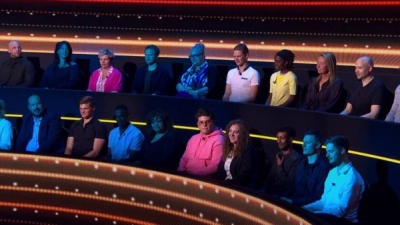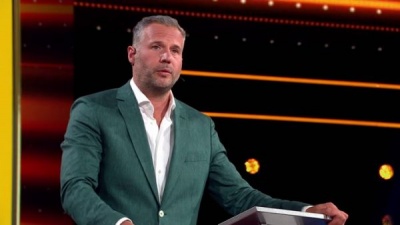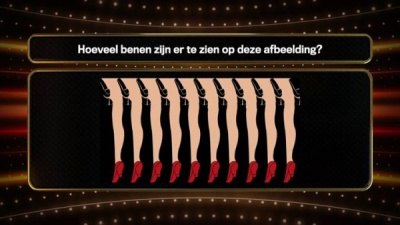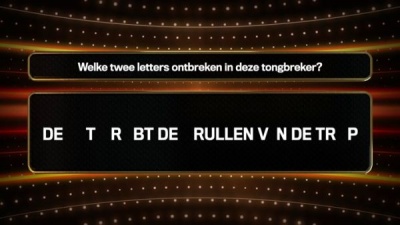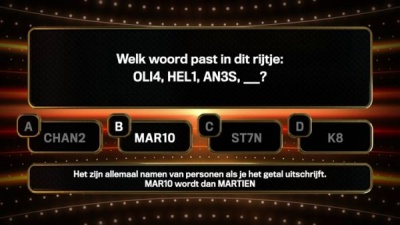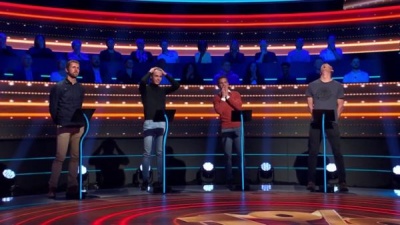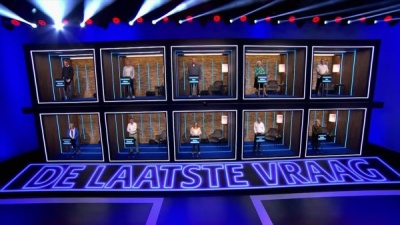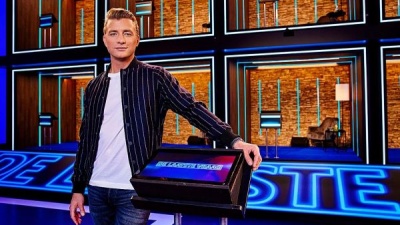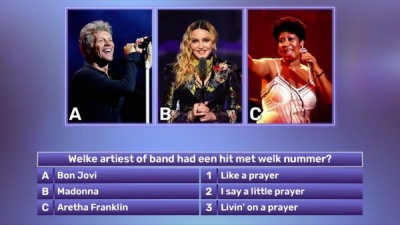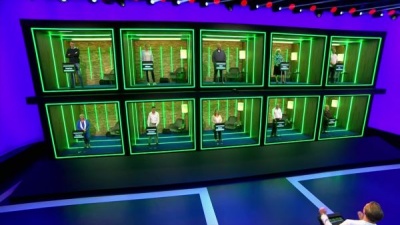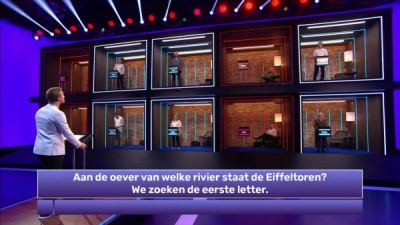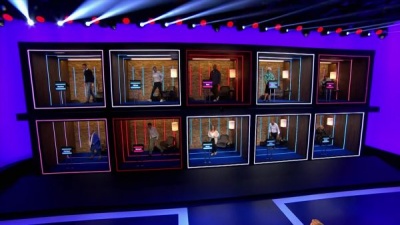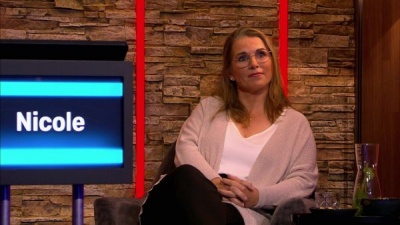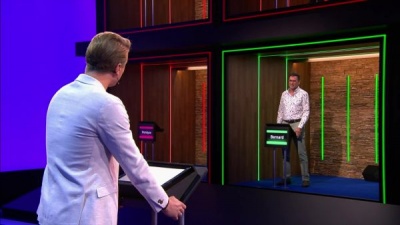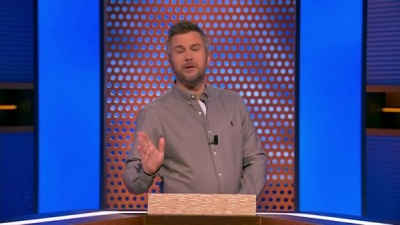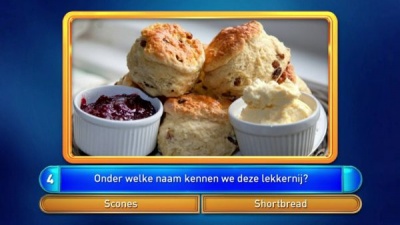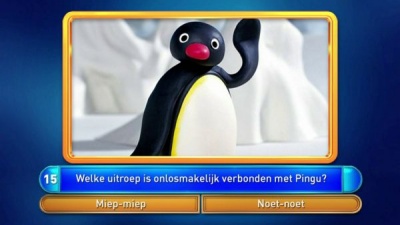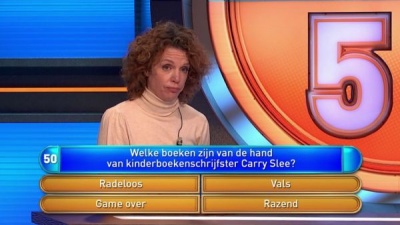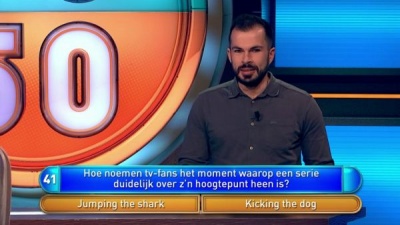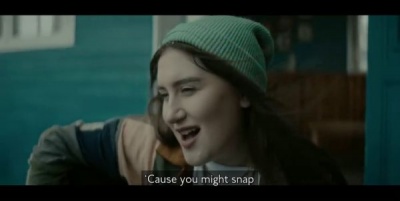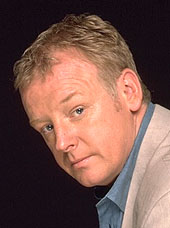Weaver's Week 2022-07-24
Last week | Weaver's Week Index | Next week
With the domestic schedules full of sport (BBC), filler (ITV), and non-game stuff (C4), we're a bit stuck for what to write. Three Dutch shows under review this time. One of them is very familiar, the other two surely won't be.
Contents |
De 1% Quiz
Bluecode (a Fremantle company) and Magnum Media for RTL4, from 21 May
It's a local version of The 1% Club, which we reviewed a couple of months ago.
As is the way these days, the format is sold almost complete. Not just how the game works, but how it looks and sounds and feels on screen.
The result is a programme very similar to ITV's breakout hit: even if you didn't speak a word of Dutch, you would recognise this programme just from looking at it. Or from flicking around – the opening episodes went out on the same night as ITV's editions, and only an hour earlier.
What are the differences? A new host, for one. Lee Mack can do many things, but he's not known for fluency in Flemish. Tijl Beckand is the presenter, known to RTL's viewers from De Verraders and other hit shows. De 1% Quiz needs someone who can work with a crowd, bring out the biggest characters and ever-so-carefully ramp up the tension. We don't yet have a data point on how difficult this job is, because Lee and Tijl both make it look stupendously easy.
Though the structure is similar, the budget is somewhat lower. It's € 500 (£415) for each player, slightly less than half ITV's amount of £1000. The top prize is therefore € 50.000 (£41,500) – somewhat more than one year's average wage. Without watching a show, we think this would encourage people to play the final question a bit more – they're not risking so much.
De 1% Quiz is billed as a 55-minute show, so has two internal breaks – after the 60% and 25% questions. ITV takes three breaks, after 60%, 35%, and 15%. The pass rule is the same – you can pay for a pass from the 50% question, and anyone still with their pass can still cash out after the 35% one.
Some questions are very familiar. Observation questions, those about the alphabet, some number questions – they can just transfer straight through. We haven't gone through the exact value of each question – was the "legs" question a 40%-er on ITV – but we expect they're about the same.
Watching De 1% Quiz in a foreign language allows us to see if the questions are tied to a particular culture. The show claims to ask questions based on "logic and common sense", but do they presume other cultural points that inburgers might not know?
Of course the questions rely on Dutch language and culture. If you're not a native speaker of Dutch, you probably won't know the language's common tongbrekers. We've no difficulty with this fact, the show doesn't claim to be "culturally neutral" in the way other logic puzzles do.
There are some very little changes to the presentation. When the number of contestants leaving is shown, there's a sharp round of applause. We like this, everyone congratulates the people still in the contest, and later there's respect for the people who have gone this far but no further.
Later in the game, there's money from passes and money from wrong answers. Lee Mack adds both of these in one go, Tijl Beckand adds the wrong answers, and then the passes. Can be a bit confusing, but helps us to work out how many passes are still out there. Once the totaliser has reached the maximum, Tijl won't return to it after every question. Lee spent a bit too long saying "there's still £96,000 in the pot" after four people took their money earlier.
Our sample season-opening episode ends with four on the floor, all got the 5% question right, all paid for a pass earlier. They're offered a piffling € 1250 to leave without playing, so they all play. None of them get the answer right.
Though it didn't show on screen, The 1% Club had some difficult recording sessions. Have they learned from the production problems? They might have done. There are very few open response questions in the first half of the show: it's multiple-choice, or numbers, or a very short word. That makes the checking so much easier, and hence quicker.
While we hope there are many more to come, we don't intend to watch every international version of The 1% Club. A solid format is a solid format in any language...
De Laatste Vraag
Talpa Entertainment Productions for SBS6, autumn 2021
...and a format with one gimmick is a format we're bored of by the end of the first episode.
Take, if you will, the house from Fun House. Five rooms on the ground floor, five upstairs. Remodel them in the 2020s style: minimalist and a bit dull. Remove all traces of personality, make them all uniform and identical. Remove all decoration, except for a podium and an armchair.
Congratulations! You now have the set for De Laatste Vraag.
The set is literally the most interesting thing about De Laatste Vraag, a primetime show sponsored by one of the lottery companies. The objective is to be in play when the titular Last Question is asked.
Jan Versteegh is the host. We met him last year on Lingo (met ballen), he's previously been on Expeditie Robinson. Young man, charming and personable, makes everyone feel relaxed. He's on top of the show's rules, which are relatively simple.
Questions are asked. They come in various styles – some multiple-choice, some numbers, put things in order. Some are matching options – which singer sang which song.
There are a few open general knowledge questions, but contestants need only put in the first letter of the answer. Some of the questions have more than one answer, and players are told when they need to select (say) three options from five.
When you answer the question correctly, nothing much happens. You remain in the game, and can answer the next question.
But should you get one wrong, you retreat to the other corner of the room, sit down and sit out. The next question goes to the remaining players, those who got this one right.
"Ah, but how do they fill a 50-minute primetime slot with this sort of thing?" Yes, sooner rather than later, everyone will have got a question wrong. And when that happens, there's nobody left to play. Does Jan Versteegh fill in the time, tap-dancing a short treatise on whether the description «de Gouden Eeuw» is a colonialist throwback and no longer part of polite society?
Of course he doesn't!
When there's nobody left, everyone comes back in. Stand up, step back to the podium, and start over.
The game repeats and repeats and repeats, until we reach the final question. This comes as a surprise to the players in the studio, and perhaps to those of us watching the show more than the clock.
The last question is a bit different. Everyone who is in play can win money on the final question. A correct answer will split € 25.000 between the right answers. The show is arranged so that there won't be all ten in play at the end; if nobody gets the question right, it's a flat € 2500 for those who don't play.
De Laatste Vraag is a very low-energy show. Most of the players spend a lot of the time relaxing in the armchair, just in case they're called back to action.
There's no communal pot, no countdown of questions remaining. Both of these feel like format points, things they've deliberately chosen not to do.
The result is a very calm show, unruffled in its pursuit of moderately difficult trivia, and not particularly exciting. It's hypnotic in the same low-key way as late-80s word game Catchword: nothing much happens, the chat is amiable but not riveting, the end will eventually arrive. We get to know a little bit about some of the contestants, and the whole programme feels like a 40-minute commercial for the sponsoring lottery company – they get a literal commercial in the middle of the programme.
Could we see a version of this show on television over here? Not really. It's too low-energy for daytime BBC, not good enough for ITV, not quirky enough for Channel 4, not young enough for any other channel. Channel 5 might have gone for it in the past, keep the same players for a week and/or jam in a call-and-lose contest, but it's not their style now.
Frankly, the most likely place for De Laatste Vraag is one of the many Twitch streams, creating new entertainment out of old formats. Viewers in the Netherlands tended to agree, ratings figures were poor – 250,000 on a Saturday night isn't up to SBS6's usual standard.
50/50
Talpa Entertainment Productions for SBS6, from 2020; moving to Net5 in August
It's literally all That. Except when it's all This.
Winston Gerschtanowitz is the host of 50/50, a show for half-an-hour of your teatime – episodes air around 18.30.
Two players take part, and stand opposite each other at the ends of an extended "V" shape. The host stands in the middle.
50/50 is very simple. Each programme consists of fifty this-or-that questions, assigned to one player or the other. € 50 in your pot for each correct answer.
The returning champion from yesterday's show starts today's programme. Get it right, keep possession. Get it wrong, play passes to your opponent. Is this familiar from another Talpa show on the same network? Could be!
Varied questions on this programme, there are plenty of pictures, a few videos and some audio clips. It's not just Winston reading out facts and asking if it's true or false.
Play continues in this vein for about 25 minutes, questions seem to get a little harder as we go on. Eventually, we reach question 50, the 50th and final question in 50/50.
Whoever's in charge of this final question has a choice. They can play it themself, or pass across to their opponent. It being the final question, and this being a Talpa format, it's a bit different. Four possible options, of which two are correct.
If the player playing picks the correct options, they win the money they've accumulated plus 50€ for the final question. Otherwise, the other player wins their pot. The day's loser leaves the programme without any consolation prize, not even a 50/50 mug tree.
Like De Laatste Vraag, this is another spectacularly low-energy quiz. It's family viewing for people who can't watch for the full hour, parents cooking a meal, children finishing their housework. The programme gives away about € 1500 (£1250) a day, it's cheap and cheerful telly. In a 35 minute slot, it doesn't outstay its welcome – Dutch television is happy to make short programmes, not everything has to run for a full hour.
SBS6 is owned by Talpa Television, which also owns Net5. As part of an internal restructure, 50/50 and Lingo will move to Net5 from the start of the autumn season. SBS6 will concentrate more on reality shows.
Could we see it on telly here? No chance. Thirty years ago, it could have gone into the overnight schedules as a Highly Ironic Programme for the tipsy and the students, but even that slot has died off. One for the streamers? Could work as a warm-up game, one that runs automatically as people join the stream.
In other news
Any other news this week? There might have been, we could have missed something while watching repeats of The Greatest Snowman and BBC1's Freeze the Fear.
Very pleased to see that "Snap" is a top ten hit in Ireland, and a ranked hit on Britain. Rosa Linn's song was criminally under-marked in May's Senior Eurovision Song Contest, but you cannot keep a good song down. There's been careful marketing (a remix came out in June), a short promo tour, and a lot of endorsements on TikTok. It's a song to draw everyone in, empathise with the singer and her wish to make all ~~this~~ go away. This column said in March that "Snap" was going to be a hit, we're glad to be proven right.
A very quiet week for new shows, with lots of sport on the BBC and lots of filler on ITV. It's summer, and we don't even have a second run of The Void to excite us. The final of Bake Off the Professionals (C4, Tue), the final of Hungry for It (BBC3, Tue). And a new 8 Out of 10 Cats Does Countdown (C4, Fri). Any sign of University Challenge? Nope, though BBC Brain returns on 1 August.
Unexpected oldies turn up. Next Saturday has Bruce Forsyth's The Generation Game (BBC4), a repeat from 1993. An episode of Noel's House Party follows a week later. And with Colin Murray unexpectedly indisposed, Les Dennis (Les Dennis!) is going to host Countdown (C4) from 4 August.
We're going to take next week off, while we work on a profile of another living legend.
But first! Answers to the questions:
- just like on ITV, there are 21 legs (10 vrouwen en 11 mannen);
- add K and A for "De kat krabt de krullen van de trap";
- the names are Oliver (oli-vier), Helen (hel-één), Andries (an-drie-s), Martien (mar-tien), all friends of Stien (s-tien);
- Madonna did "Like a prayer", Aretha "I say a little prayer", Bon Jovi "Living on a prayer";
- The Eiffel Tower is by the Seine;
- The picture was scones, but V F E 10 M;
- Pingu says "miep-miep";
- Carry Slee wrote "Radeloos" and "Razend". Well done if you got that at home.
Pictures: Bluecode (a Fremantle company) and Magnum Media, Talpa Entertainment Productions, AMPTV.
To have Weaver's Week emailed to you on publication day, receive our exclusive TV roundup of the game shows in the week ahead, and chat to other ukgameshows.com readers, sign up to our Google Group.


